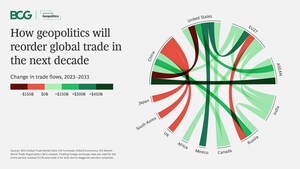New Study by BCG and WWF Details an Action Plan to Help Public and Private Sectors, Financial Institutions, and NGOs Prioritize Resilient Nature-Based Solutions and Foster Innovation in the Water System
BOSTON, April 26, 2023 /PRNewswire/ -- The world is facing an increasingly severe water crisis, exacerbated by climate change and the degradation of freshwater ecosystems, but this has yet to translate into meaningful action by businesses and governments. Approximately 1.4 million people die annually from preventable diseases linked to unsafe water, and roughly half of the world's population is experiencing severe water scarcity for at least part of the year. Globally, the demand for water is increasing nearly 1% per year and demand will continue to grow due to shifting patterns of consumption and population growth.
According to a new study by Boston Consulting Group (BCG) and WWF, titled "Nature-Based Solutions to the Water Crisis," evidence for the effectiveness and potential of nature-based solutions (NbS) to mitigate water security pressures is compelling. NbS are actions to protect, sustainably manage, and restore natural or modified ecosystems—solutions that address societal challenges effectively and adaptively while also providing human wellbeing and biodiversity benefits. They help protect against increasingly extreme floods and droughts, enhance coastal protection against storms and rising sea levels, improve water supply and quality (often at lower cost than engineered solutions), promote local biodiversity, and regenerate freshwater ecosystems.
"The recent UN Water Conference underscored the urgent need to find bold solutions to the global water crisis," said Torsten Kurth, BCG managing director and senior partner and coauthor of the study. "But it's time to stop admiring the problem. It is critical that we shift from an outdated, reactive, risk-based approach to water management to implementing and scaling resilient, nature-based solutions to water challenges."
An Increasingly Severe Planetary Crisis
For more than a decade, water-related risks have led the World Economic Forum's global risk assessment in terms of both likelihood and severity of impact on both people and businesses. The Intergovernmental Panel on Climate Change projects that water-related risks are likely to increase with every degree of global warming. The cost of flood damages totaled approximately $82 billion globally in 2021, roughly double the average losses between 2011 and 2020, and is expected to increase in the years ahead.
Without prompt action, access to water, food security, and ecosystem quality will decline, while economic risk continues to rise. According to the study:
- Without interventions, by 2030: 1.6 billion people will lack safely managed drinking water and 2.8 billion will lack safely managed sanitation.
- Without interventions, by 2050: 23% of the area used for rice production and 42% of the area used for wheat production will face high water scarcity risks.
- Without interventions, by 2070: Expect a 26% increase in harmful pollutants into river basins and a 6% reduction in areas with high aquatic biodiversity.
A Global Water Transformation is Required
Historically, governments and companies have taken a reactive, risk-based approach to water management; one that focuses on mitigating the economic consequences of floods and droughts but pays little consideration to environmental impacts. Their mindset on the global water crisis must shift from risk to resilience. While the risk-based approach minimizes economic costs exclusively, takes a reactive short-term approach to reduce the risk of extreme water hazards, and damages parallel ecosystem services, the resilience-based approach integrates social and environmental (as well as economic) metrics, provides an adaptive long-term strategy for water management, and delivers co-benefits such as biodiversity, water filtration, and tourism.
To develop a nature-based and resilient water system, the private sector, public sector agencies, non-governmental organizations, and financial institutions must collaborate to embed resilience in the water system. Technological innovation, supportive water governance mechanisms and economic policies, more efficient water operations, and traditional infrastructure and nature-based solutions all have their roles to play in improving how societies manage water. BCG and WWF devised a four-step action plan to drive real progress on water security by drastically increasing investment in NbS:
- Prioritize water as a key lever for adapting to climate change, building resilience and becoming nature positive.
- Foster nature-based, locally led innovations across the water value chain.
- Implement nature-based solutions for water security as part of future infrastructure projects.
- Scale investments in nature-based solutions to boost water security and create resilient ecosystems.
"We can tackle the world's worsening water crisis, but only if we remember one of the world's most forgotten facts—water does not come from a tap, it comes from nature," said Stuart Orr, WWF Global Freshwater Lead. "Drastically scaling up investment in healthy rivers, lakes, and wetlands is fundamental to ensuring water for all in an increasingly water stressed world. But protecting and restoring healthy freshwater ecosystems will do more than keep the taps and pipes and pumps flowing. Our freshwater life support systems are central to food security, adapting to increasing climate change-related droughts and floods, and achieving the Sustainable Development Goals."
Download the publication here.
Media Contact:
Eric Gregoire:
+1 617 850 3783
[email protected]
About Boston Consulting Group
Boston Consulting Group partners with leaders in business and society to tackle their most important challenges and capture their greatest opportunities. BCG was the pioneer in business strategy when it was founded in 1963. Today, we work closely with clients to embrace a transformational approach aimed at benefiting all stakeholders—empowering organizations to grow, build sustainable competitive advantage, and drive positive societal impact.
Our diverse, global teams bring deep industry and functional expertise and a range of perspectives that question the status quo and spark change. BCG delivers solutions through leading-edge management consulting, technology and design, and corporate and digital ventures. We work in a uniquely collaborative model across the firm and throughout all levels of the client organization, fueled by the goal of helping our clients thrive and enabling them to make the world a better place.
SOURCE Boston Consulting Group (BCG)

WANT YOUR COMPANY'S NEWS FEATURED ON PRNEWSWIRE.COM?
Newsrooms &
Influencers
Digital Media
Outlets
Journalists
Opted In






Share this article